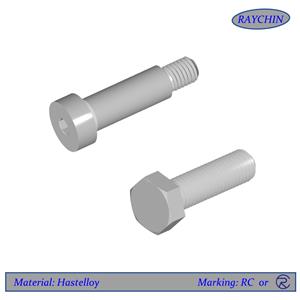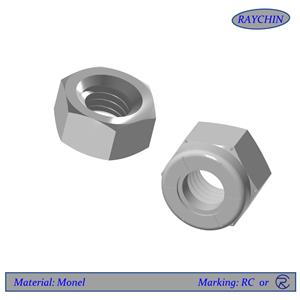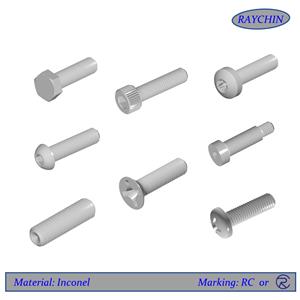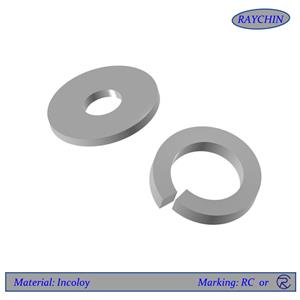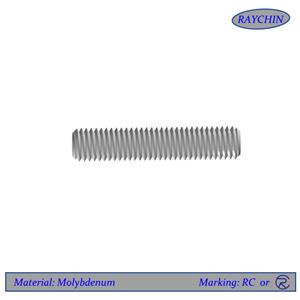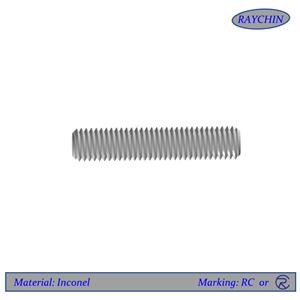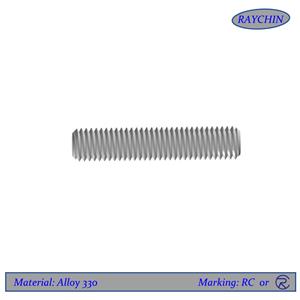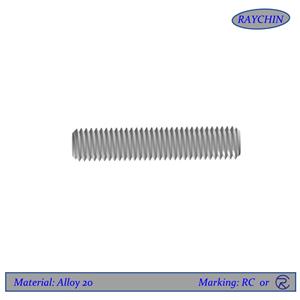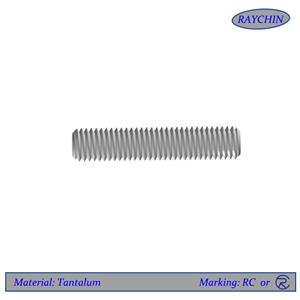-
Molybdenum Threaded Rods
Molybdenum threaded rods possesses a very high melting point of 2620°C, a low coefficient of thermal expansion and a high level of thermal conductivity. Because molybdenum threaded rods have the ability to withstand extremely high temperatures without changing shape, expanding or softening significantly, they are ideal for high strength / high temperature applications that are shielded from oxygen. Exposing molybdenum fastener to oxygen above 600°C will cause them to readily oxidize. As a result, molybdenum threaded rods find their way into high temperature vacuum furnaces, glass production, military and space applications where oxygen is not present.
Send Email Details -
Inconel Threaded Rods
Inconel® threaded rods, like Inconel 600, 601,625, 686, 718 & 725 threaded rods, are a family of nickel-chromium-molybdenum alloys used for their high strength at elevated temperatures and good corrosion resistance. Because of its high thermal stability, Inconel can be used in service temperatures ranging from cryogenic to 2200°F (982°C). The high alloy content of Inconel threaded rods enable it to withstand a wide variety of severe corrosive environments. In mild environments, such as the atmosphere, sea water, neutral salts, and alkaline media, there is almost no attack to Inconel threaded rods. In more severe corrosive environments the combination of nickel and chromium provides resistance to oxidizing chemicals, whereas the high nickel and molybdenum contents supply resistance to nonoxidizing environments.
Send Email Details -
Incoloy Threaded Rods
Not to be confused with Inconel, Incoloy threaded rods are made of a nickel alloy which contains iron and a lower content of nickel. Incoloy is essentially a more economical option to Inconel, yet with more restricted corrosion resistance and temperature limits. Typically, Incoloy is an ideal material for long-term exposure in high temperature environments due to its oxidation, carburization and creep resistance. Incoloy is widely used for its resistance to seawater, brine, sour gas and high chloride environments at elevated temperatures, which make it a popular choice in the oil and gas and power industries.
Send Email Details -
Hastelloy Threaded Rods
Hastelloy THREADED RODS RAYCHIN is a manufacturer and worldwide supplier of standard & custom THREADED RODS including those manufactured from the following materials: Hastelloy® C-276, Hastelloy® C-22, Hastelloy® B-2, Hastelloy® G-30, Monel® 400, Monel® K-500, Inconel® 600, Inconel® 625, Inconel® 718, Incoloy® A-286, Titanium Grade 2, Titanium Grade 5, Titanium Grade 7, Duplex S31803, Duplex S32205 and Super Duplex S32750, to name a few.
Send Email Details -
Alloy 330 Threaded Rods
Alloy 330 threaded rods are specifically designed for high temperature furnace applications such as vacuum furnaces, heat treating and brazing applications. The most prized trait of alloy 330 is its ability perform under cyclic conditions of temperature extremes from heating and cooling; as well as in alternate carburizing and oxidizing atmospheres. An austenitic, nickel-chromium-iron-silicon alloy, 330 threaded rods also offer industry a low coefficient of expansion, excellent ductility, and high strength. Applications for Alloy 330 Threaded Rods Alloy 330 threaded rods are often used in furnaces, thermal processing and heat treating applications. Gas turbine components and boiler fixtures used in power generation often use Alloy 330 threaded rods. Because of its resistance to nitrogen rich environments, alloy 330 rods are used extensively for components handling cracked ammonia.
Send Email Details -
Alloy 20 Threaded Rods
Also known as Carpenter 20 and 20CB-3, Alloy 20 threaded rods offer users a combination of nickel, chromium, molybdenum, and copper which provides good general corrosion resistance. Alloy 20 threaded rods are best suited for mid-range corrosion use – better than steel alloys but not at the level of high performance nickel based alloys like Hastelloy C276. Alloy 20 is a nickel alloy that was specifically designed to withstand the harsh environment of hot sulfuric acid but also performs well in a variety of other acids. Alloy 20 threaded rods are an ideal choice when you don’t need the corrosion resistance power and price-tag of high performance nickel alloys like Hastelloy C276; but you need something that will give you more protection than 316 stainless steel or even a Super Duplex 2507 stainless steel.
Send Email Details -
AL6XN Threaded Rods
Originally developed to combat sea water corrosion, AL6XN has expanded its role as being good mid-range corrosion resistant alloy. AL6XN threaded rods are a low carbon, high purity, nitrogen-bearing "super-austenitic" stainless alloy. Also considered a 6Moly alloy, AL6XN rods are similar to Alloy 926 and SMO 254 in composition and capabilities. With a higher nickel and molybdenum content than Duplex 2205 and Super Duplex 2507, it delivers better corrosion resistance while giving a more cost effective alternative to nickel super alloys like Inconel or Hastelloy in moderately corrosive conditions.
Send Email Details -
Tungsten Threaded Rods
Tungsten threaded rods are known for their extreme high density; because of this unique attribute, they are often used for balancing rotating parts. Tungsten’s high mass also makes these screws radiopaque. This allows tungsten rods to block radiation and show up well on x-rays – even better than lead. Another unique attribute of tungsten is its extrmely high melting point of 3420°C. The high temperature stability of tungsten threaded rods make them ideal for some of the hottest vacuum furnace environments.Beyond their high mass and temperature stability, tungsten fasteners are also very corrosion resistant. Tungsten threaded rods are usually made from tungsten alloys per ASTM B777, and range from 90% to 97% pure tungsten, alloyed with nickel and copper or nickel and iron.
Send Email Details -
Tantalum Threaded Rods
Tantalum threaded rods are best known for its unmatched corrosion resistance and chemical inertness. Tantalum threaded rods have a similar corrosion resistance to that of glass, but all of the typical mechanical and electrical properties of a metal. Tantalum threaded rods are also extremely stable at high temperatures, since tantalum has a melting point around 3000°C. High temperature applications require vaccum or inert gas since tantalum may embrittle when used in oxygen rich environments above 250°C. Tantalum threaded rods are also one of the most bio-compatible metals available and is also radio-opaque due to its high density (16.68 g/cm3). All tantalum threaded rods are available in commercially pure tantalum and tantalum 2.5% tungsten (Ta-2.5%W).
Send Email Details

